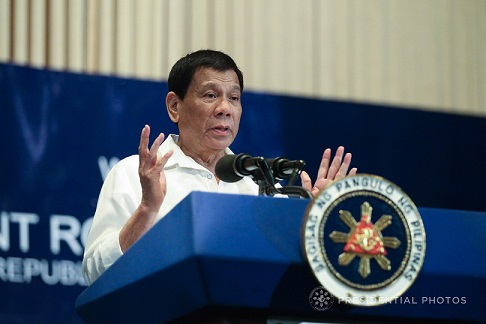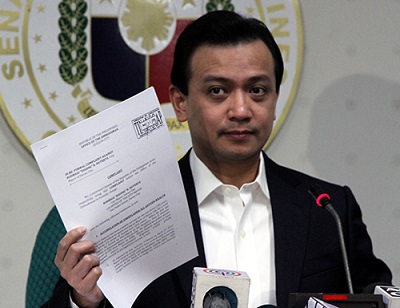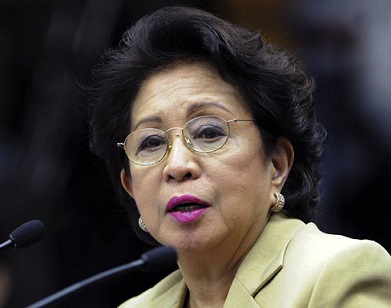
Duterte was leading the surveys in the contest that he eventually won convincingly.
With the powers of the presidency, Duterte has been effective in crushing most of political his enemies. His devoted mob has been successful in spreading chaos in cyberspace.
But as one sage said, “Truth is always like oil in water; no matter how much of water you add, it always floats on top.”

Duterte’s situation is like a man who has stepped on a quick sand. He is panicking and the more he moves, the more he sinks.
Trillanes filed yesterday a resolution asking the Senate to start the investigation on Duterte’s undeclared wealth.
The resolution seeks to look into bank documents under the name of President Rodrigo Duterte and Davao City Mayor Sara Duterte-Carpio showing their undisclosed ‘covered transactions,’ or transactions exceeding Php 500,000.00, which may have violated the Anti-Money Laundering Act (AMLA).
“President Duterte must address this issue squarely once and for all and stop fooling the Filipino people. If he has nothing to hide, he should bare it all and sign the waiver. On the contrary, he has been dilly-dallying in his statements, and instead has been bluffing the people by publicly ordering AMLC to investigate his alleged bank accounts, although we all know that AMLC would not do it unless he signs a waiver on bank secrecy,” Trillanes said.
In the proposed resolution, Trillanes particularly noted the report made by VERA Files that Duterte and his daughter, Davao Mayor Sara Duterte-Carpio failed to fully disclose in their Statements of Assets, Liabilities and Net Worth (SALN) their joint deposits and investments, which exceeded Php100 million, under the Bank of the Philippine Islands (BPI).

Senate President Aquilino Pimentel III, an ally of Duterte, immediately opposed Trillanes’ resolution saying it’s a ‘tragic waste of time.”
In the Office of the Ombudsman, Duterte is not getting an easy ride despite his strong-arm attempts to quash efforts to investigate his undeclared wealth in connection with the plunder charges filed by Trillanes in May 2016.
Ombudsman Conchita Carpio-Morales refused to carry out Malacañang’s suspension of Deputy Ombudsman Melchor Arthur Carandang for allegedly “leaking” to media contents of the bank records transmitted by AMLC, which denied having sent anything to the anti-graft body.
Amid threats by Malacañang lawyers of impeachment against Carpio-Morales and legal sanction against Carandang, former Solicitor General Florin Hilbay issued a statement supporting the Ombudsman:
The 90-day suspension order of the President, made thru the Executive Secretary, is a patently unconstitutional order which constitutes not just an attack on the independence of the Office of the Ombudsman and but also, and more important, the Supreme Court.
1. The 2014 Supreme Court decision in Gonzales III v. Office of the President is clear: the President has no disciplinary authority over a Deputy Ombudsman. The decision to suspend Mr. Carandang is therefore a “collateral attack” on a final and executory judgment of the Supreme Court. This cannot be done.
2. The burden is therefore on the Executive Department to first seek a reversal of the prior judgment of the SC before acting inconsistently with that jurisprudence.
3. Ombudsman Carpio-Morales acted correctly in rejecting the President’s order to suspend Mr. Carandang because she has the two-fold obligation of following the Constitution and protecting the independence of her office. The law is clear, she simply followed it.
4. True, the SC can reverse its 2014 decision–but that is also beside the point. No public official, not even the President, can adopt a “violate-the-law-now, seek-reversal-later” attitude when its comes to decisions of the SC. That attitude is incompatible with his constitutional obligation to enforce the law: it is the anti-thesis of the rule of law.
5. The disrespect to the Supreme Court and the Office of the Ombudsman is even more palpable because what triggered the action of the President is an investigation being conducted by the Ombudsman regarding his ill-gotten wealth. The unconstitutional act is tainted by a personal conflict of interest. The President is acting not to protect a beleaguered citizen from abuse of power by the Ombudsman; he is acting to protect himself. This act cannot pass any standard of fairness.
6. As a procedural and constitutional matter, given the prior judgment of the Supreme Court, it is the Office of the President that must bring the matter to courts, not Mr. Carandang or Ombudsman Morales. In the meantime, unless the SC decides otherwise, the Ombudsman can rely on the prior decision of the SC.
Be First to Comment